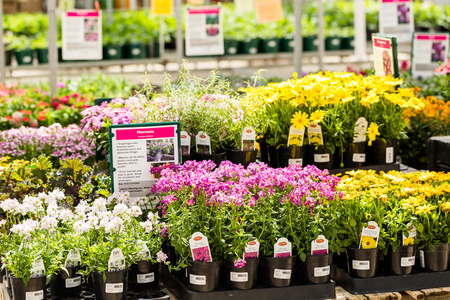Plant data & photos must-haves for customers
Vineland research shows that 88% of the consumers looking to buy plants cannot find enough information to make the right buying decision. Plants are complex products. Informing your customers well, both online and in-store, is therefore essential. How exactly do you do that? What options do you have around selling plants?
In this blog, we explain how garden centres and growers approach selling plants online, how to make sure your customers have the right plant data and plant photos, and how to link your online & offline channels.
Selling plants online or not?
Every week we are asked whether it is smart to sell plants online or not. The answer to that question is complex. After all, from the garden centres’ point of view, packaging, stock management and logistics are quite a challenge. Yet there is a demand for it, as online plant sales continue to grow even after Covid-19.
Selling plants online is complicated for a garden centre because the dynamics in a shop are more complex than for a webshop that only sells online.
- Stock is difficult to keep track of. Plants are not always coded with an MPN or EAN properly and availability varies daily.
- Packing plants takes time, efforts and a lot of material (and therefore money), it is difficult to come up with a solution for every plant to ship it properly, especially if you are not specialised in it.
- The most beautiful plants are also the most vulnerable, think of garden plants in bloom or large houseplants.
Still, we think plants should be given ample space on garden centre websites and webshops since it’s the number 1 product centres are known for!
That doesn't mean that everyone has to start selling plants nationwide now to benefit from this. We give you two other options for making moves online without breaking your neck over nationwide plant delivery.
Local delivery of plants
This first option is already used by many companies. You can define regions in the Garden Connect platform and choose to deliver plants only in a certain region. By doing so, you help your existing customers from the region, making the interaction between website and garden centre stronger.
After all, someone who browses your webshop today can drop by tomorrow, as they live nearby after all. Or think about people without a car or who have difficulty walking: they can hardly ever visit your garden centre. And if they can get there at all, taking a large plant back with them on a bike or bus is impossible. This solution still gives your local customers the opportunity to order online.
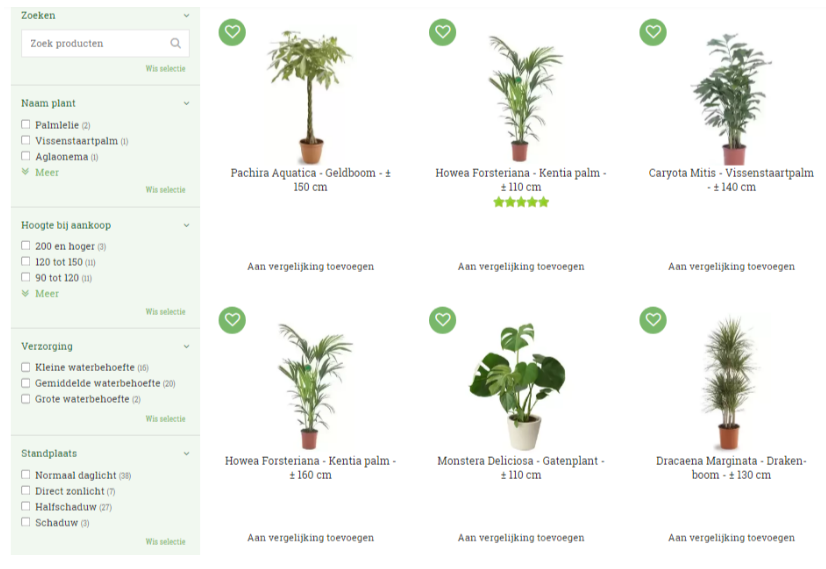
Online showroom
The second option is to set up an online showroom with plants. Take a look at the example above at Eurofleur (Dutch). Unlike a webshop where you make plants orderable, here you only display the plants. This gives you the advantage that people can see what you have to offer but cannot place an order: so you don't have to worry about delivery and the like.
Some things that are important to know:
- You can show your plant range, possibly without price and pot size. On our platform, we have an option available to do that.
- You can offer your customers to make a shopping or wish list so they can prepare for their store visit properly.
- If you choose this option, you should note that product pages are not optimally findable in Google. This is because since December 2022, Google values product pages without an order button less than product pages with an order button.
Still, we recommend showing your plants even without an order button, because visitors to your website do appreciate the information shown.
Search filters in your webshop
Whether you have a webshop, local webshop or showroom: you need to help the customer with good search filters. Search filters are linked to plant properties and are hugely important! At Cowell's they are on the left-hand side:
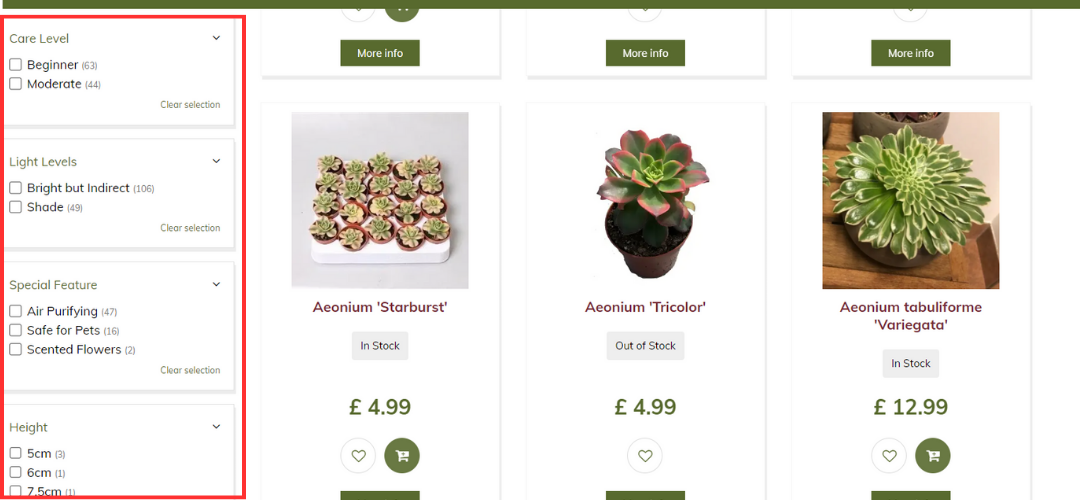
Some examples:
- With houseplants, it is important to indicate the position (sun or shade) with all your plants so that customers can easily filter on this.
- Whether plants are toxic to pets and children is also important.
- Whether they can withstand frost is a popular question for garden plants, so make sure you include that in your filter.
Our plant database has over 100 possible properties available per plant. You don't have to put all these properties in a filter, but properties always form the basis of search filters.
Without properties, no search filters, and without filters, your customers cannot find the best plant for their situation.
Plant photos
Suppose you visit a garden centre or webshop and are looking for a grape plant. Then this photo is about what you come across:
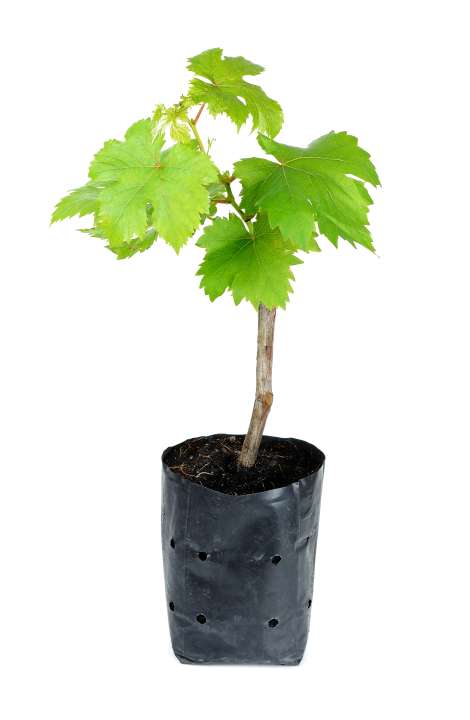
Of course, this picture tells absolutely nothing about how the plant will grow in the coming years and what it will eventually look like. By showing pictures of different growth times of the plants, you give the customer a better idea of what to expect:
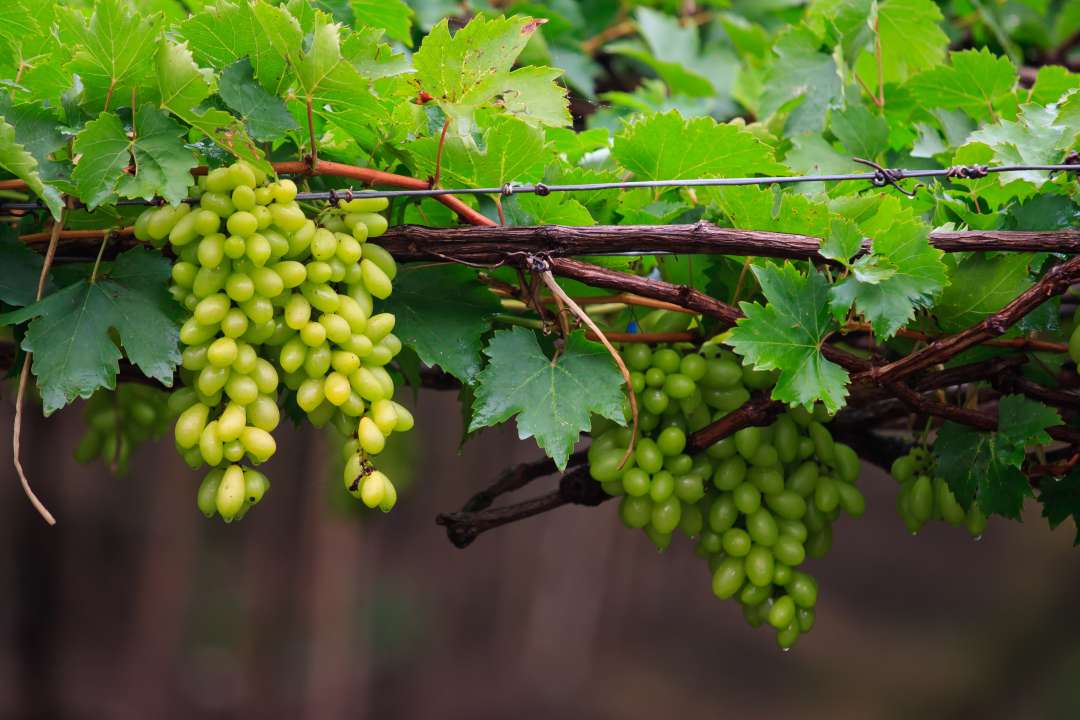
Of course, there is sometimes a picture on the plant label, but it is often small and also unclear. The advantage of online, of course, is that you can show a series of photos. Because in addition to the picture above, you might also want a picture of the leaf:
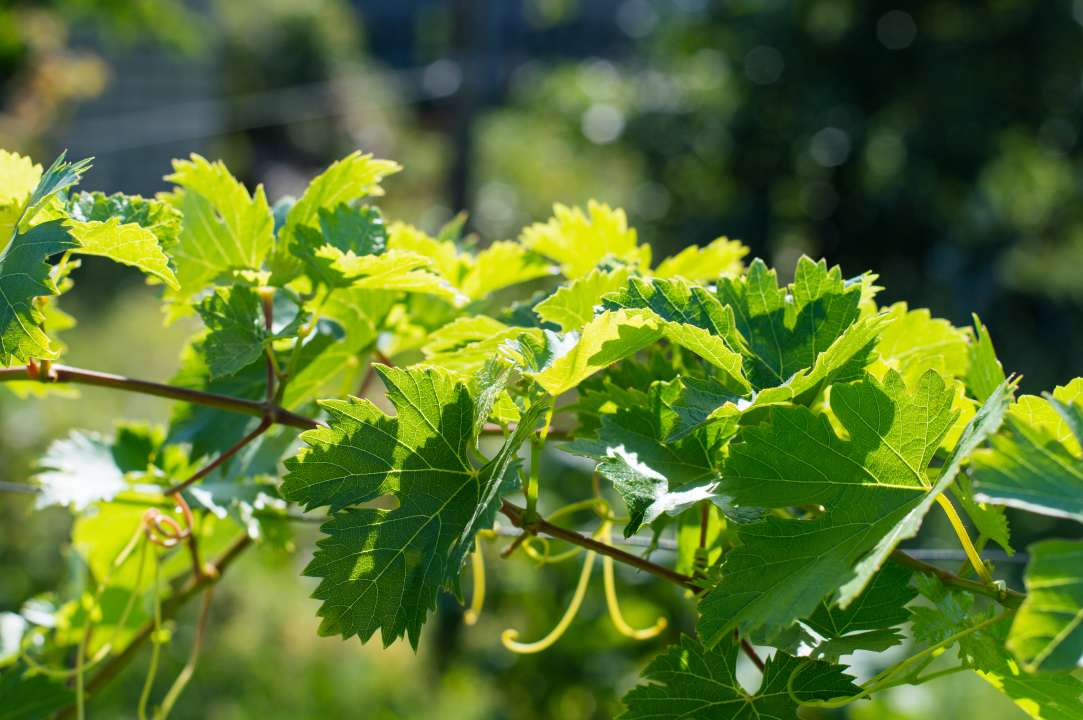
And a photo of the grape plant climbing a wall:
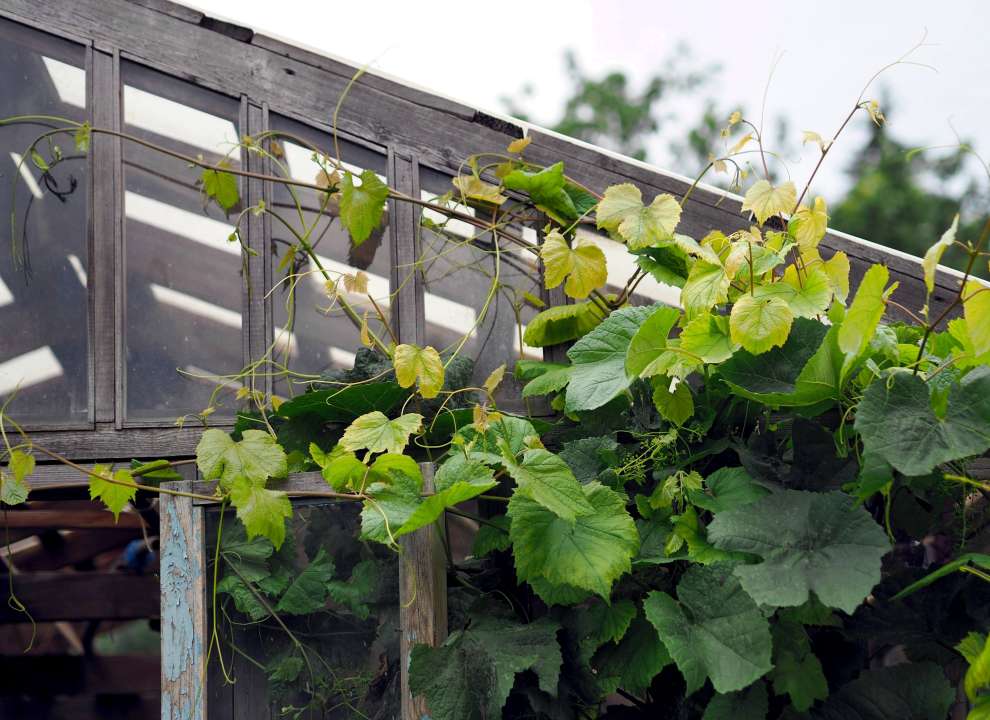
All these photos individually do not give enough information, but all four together give a complete impression of the plant. Having the right plant photos is essential. Your customers need this information to understand what the plant will eventually look like.
In-store price signs
You can use the plant data and plant photos we have online, but of course, also on the shop floor. Many customers are not (or no longer) familiar with plants and therefore have many questions about the plants you sell.
After all, not everyone knows that a grape plant likes to stand in full sun!
Give the right information to your customers, but also not too much. It is important to know your target audience:
- If you have a "lifestyle shop", then it is important to show the essential information about plants and most importantly not too much info.
- If you are a specialist or nursery whose customers know much about plants, they expect more substantive information.
If you turn this around, things go wrong:
- If you give a novice too much information, they will not understand it, feel overwhelmed and drop out.
- If you give a plant lover too little information, they will not take it seriously and will also drop out.
A lot of research has been done on this in garden centres, so use this information to create the right price signs to suit your target audience and visitors.
With our online solution, you can easily create signage:
- Formatted in your own branding
- Includes plant photos, so customers can see what the plant will (eventually) look like
- Plant data to give tips on location, watering and so on
This information is exactly what your customers need when they are visiting your garden centre. Below is an example of an effective price sign that includes only the most necessary information:
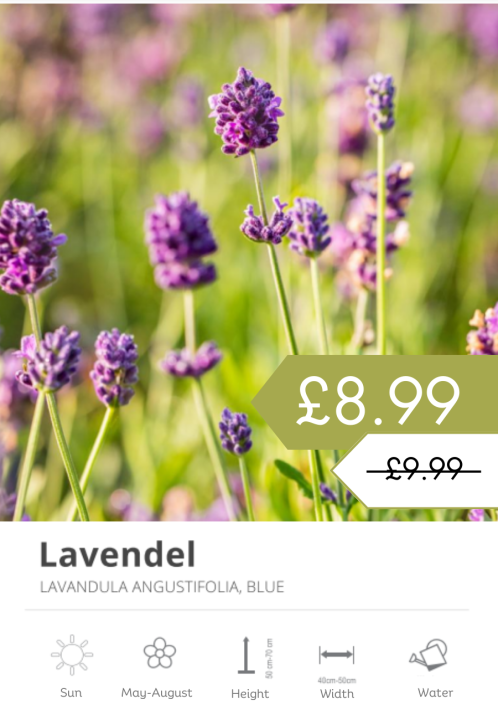
Both the photo and features come from our platform, the design is customisable, of course. If you want to include more information on the sign because your customers are plant geeks, that is also possible:
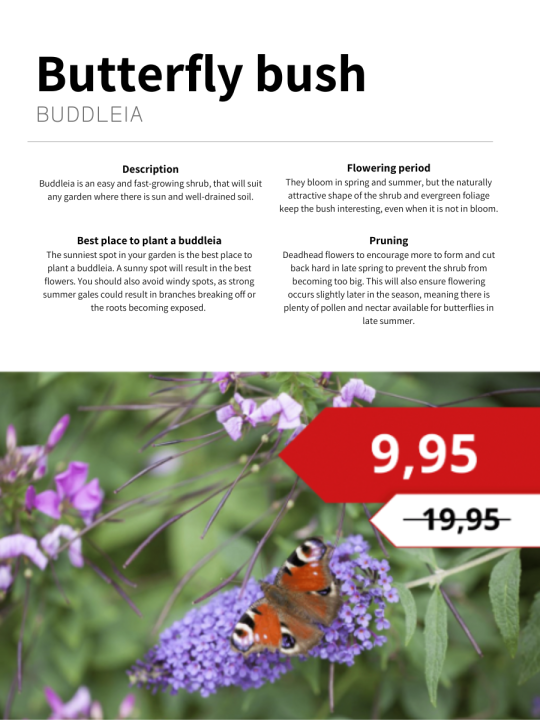
Searching for plants on Google!
In our Garden Retail Market Update, we conduct quarterly research on the use of keywords in Google. We also focus on garden plants and houseplants to see which plants are popular.
Whereas many people think that demand for plants collapsed after Covid-19, this isn't the case. Sure, demand for plants in Google is lower than in March & April 2020, but did you know that the number of searches around plants in Google in 2023 is only 0,3% lower than in 2022? And the year isn't over yet!
Google Trends clearly shows this:
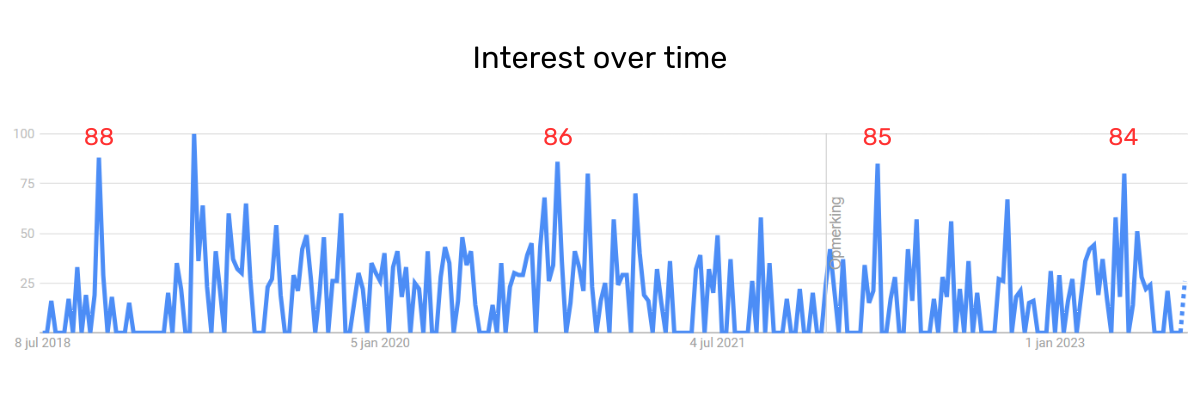 And of course, we also have a top 10 of popular plants, based on our Garden Retail Market Update:
And of course, we also have a top 10 of popular plants, based on our Garden Retail Market Update:
- Agapanthus
- Hydrangea
- Dieffenbachia
- Hibiscus
- Ajuga
- Salvia
- Coneflower
- Ivy
- Bromeliad
- Ornamental grass
Now that you know that consumers are searching in Google for plants considerably, the question is, how do you make sure you get to the top of the search results? The answer, of course, is to make sure you create good, unique descriptions for each plant.
So what exactly is a good description? You can ask 100 experts about it and you will get 100 different answers. Broadly speaking, you can use the following:
- The length of a product description should be at least 300 words. That sounds simple, but try writing 300 words about one garden plant: that's quite a challenge!
- The Latin and English names should be mentioned several times.
- Mention unique characteristics, such as colour, fruit, position, and so on.
- You have to describe and sell the product with this text!
- Do not copy other texts, because then it is no longer Google-friendly.
Writing such a text is quite a challenge, because if you have 100 plants, you have to write 30,000 words. That's about 120 A4 pages of text if you use a normal font.
Fortunately, there are solutions: for instance, we ourselves have more than 75,000 plants in our plant database. A clever solution allows us to create unique, Google-friendly texts for each webshop with just one click:
- We include the plant name and unique properties in it.
- We can also adapt the text to your writing style: neat, formal, informal, hip or something else.
- We can tailor the text to your situation: selling online or visiting your garden centre.
Of course, this saves a lot of time and using this solution has led to an increase in website visits of up to 400% at some garden centres!
So whatever you do: good plant descriptions on your webshop or website are essential to reach the Googling customer.
Plant data and plant photos: not a luxury but a necessity
Whereas the average employee or owner of a garden centre knows exactly what to do with plants, the average customer knows less and less. You can help your customer find the right plant online and in the garden centre by showing the right information.
If you would like to know more about our plant data and plant photos, or about our in-store signing solutions, feel free to let us know at info@gardenconnect.com.



